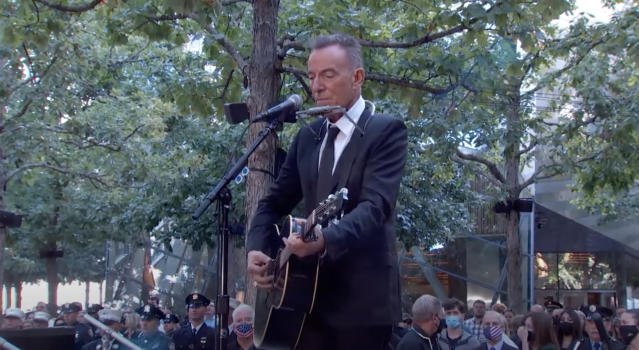

Dave Masciotra compares Bruce Springsteen’s liberalism with Ta-Nehisi Coates’s progressivism:
By the turn of the century, the New Jersey native had already established himself as a rock and roll legend. But his artistic reaction to 9/11 enhanced his importance. Less than a year after the attack, he recorded The Rising, his first album with the E Street Band since the Eighties. Despite the centrality of politics to those frantic days, the collection was strikingly unideological. Instead of protest, Springsteen opted to explore grief and mourning, and how to find hope in the immediate aftermath of a devastating loss.
Among its most effective and moving moments is “Into the Fire”, an overt tribute to the first responders who ascended the stairs of a burning, crumbling building in the desperate hope to save the lives of strangers. “Love and duty called you someplace higher,” Springsteen sings in a tender voice. “Somewhere up the stairs / Into the fire…” The chorus functions as a prayer to the heroic firefighters, police officers, and paramedics: “May your strength give us strength… May your love bring us love…”
In other words, then, Springsteen understood that the rescue workers represented and exercised the best of humanity. They were, and are, worthy of praise and remembrance that transcends narrow political strife. It’s a pride, a heartfelt patriotism, you can still spot today. At a recent rally in Georgia, in support of Kamala Harris, Springsteen emphasised the need for presidential candidates to understand the US, its history, and “what it means to be deeply American”. At a recent rally in Georgia, in support of Kamala Harris, Springsteen emphasised the need for presidential candidates to understand the US, its history, and “what it means to be deeply American”.
Such gentle flag-waving is rare on the progressive Left, placing it at odds with the heavyweights of the Democratic Party. Meanwhile, the Republican Party adores a presidential nominee who recently referred to the United States as a “garbage can”.
This angry new world was arguably forged as far back as 2015. That year, Ta-Nehisi Coates published a memoir, Between the World and Me. Framed as a letter to his teenage son, Coates examined racism in the United States, focusing mainly on police brutality.
Like Springsteen, Coates offered a reaction to 9/11. But this time, the writer is shorn of all sympathy, all grace. “Looking out upon the ruins of America, my heart was cold,” he confesses. Referring to the firefighters and cops, he writes, “They were not human to me. Black, white, or whatever, they were the menaces of nature; they were the fire, the comet, the storm, which could — with no justification — shatter my body.”
It is difficult to find a more contemptible passage in the past two decades of American letters. Yet despite such a chilling lack of empathy, Coates has won nearly every literary prize imaginable, including a National Book Award for Between the World and Me. From the American press, he receives the pious reverence typically reserved for the Pope at Sunday mass.
A rare heretic, Tony Dokoupil of CBS News, recently asked Coates a series of challenging questions about his indifference to Israeli history or suffering. In his latest book, The Message, which has a large section on the Israel-Palestine conflict and attacks Israel as an “apartheid” state, Coates never once mentions October 7. Two intifadas, or indeed any loss of Israeli life, are notable by their absence too. For exercising the mundane obligation of his profession, Dokoupil was reprimanded by the network. Many influential pundits on the progressive Left, notably Mehdi Hasan, screamed about the interview for days on social media. The digital herd stampeded toward Dokoupil’s characterisation of The Message as not out of place in the “backpack of an extremist”. The language is strong, but hardly unfair.
One wonders if to Coates, Israelis, like the firefighters rushing up the stairs of the World Trade Center, aren’t really human. Is that why they are unworthy of inclusion in his one-sided book? Certainly, the contrast with Bruce Springsteen is only heightened when you recall that, on 13 October, he performed a benefit concert for the USC Shoah Foundation, an organisation that preserves the testimony of Holocaust survivors, and raises awareness to the ongoing threat of antisemitism.
As unlikely as it might seem, then, Springsteen and Coates personify a crossroads for the American Left. Liberals and “progressives” can choose a humanistic, big-hearted liberalism, one that seeks common ground in the pursuit of personal freedom and social progress for minority groups. Or they can crawl into a sewer of a narrow delusion, one that pits “oppressors” versus “victims” and “colonisers” against “the colonised” — and where some people, no matter how much they’ve suffered or the grace that they’ve shown despite their suffering, are hardly human at all.
The deification of Coates, and the contempt for the lone journalist who challenged him, is an ill omen. And it’s far from alone.
Read the rest here.